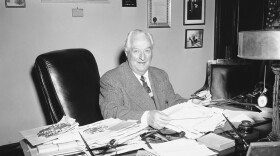Voting for a U.S. Senate candidate in Nevada is something you might take for granted... but there was a time when the decision was made for you.
This year marks a centennial that some people will celebrate … and will make others commiserate. On February 6, 1913, Nevada became the fifteenth state to ratify the seventeenth amendment to the United States Constitution. Other states quickly followed, and the amendment was ratified two months later.
The amendment changed how we elect our United States senators. Until then, state legislatures had elected them. That was part of Article I of the U.S. Constitution. Under the new amendment, the people would directly elect their senators. The measure also provided for elections and gubernatorial appointments to fill vacancies.
This issue has become controversial in recent years. Members of the Tea Party have advocated repealing the amendment. Many Nevadans long have shared the Tea Party’s displeasure with the federal government. But our state had been advocating this measure for several years before it passed. It didn’t hurt that the Populist Party supported direct election of senators. That provision became part of the party’s Omaha platform of 1892. Nevadans had supported the Populist Party through an alliance with the group over monetary policy … Populists had supported the movement to remonetize silver, which would benefit Nevadans.
But Nevadans didn’t need the Populists for this one. Nevada had a history of U.S. Senate elections that could turn anyone into an advocate of direct elections. How bad was it?
Stewart would be reelected twice more. Both times, he ran with the support of the Central Pacific Railroad. The railroad managed and underwrote his campaigns, and did even more than that. Back in 1869, one railroad executive, Collis Huntington, wrote to another that Stewart “has always stood by us. I know he must live, and we must fix it so that he can make one or two hundred thousand dollars.” Not long afterward, the railroad’s owners gave him fifty thousand acres of land.
You might be thinking, that’s corrupt, and that could happen with or without directly electing United States senators. Next time, we’ll explain a little further.








